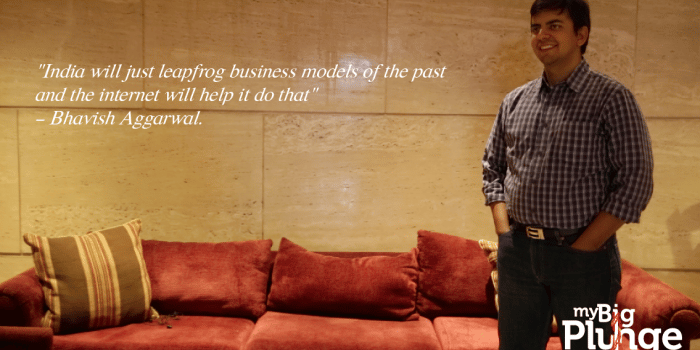In Conversation
Ola founder Bhavish Aggarwal’s meteoric entrepreneurial journey
There are many aspects that define the level of success one can achieve but nothing seems more important than having a vision to achieve what you strive for. Planning and execution do play vital roles in the journey of a successful venture but the aforementioned vision is what drives and motivates one to reach a set target. Led by the bright young mind of Bhavish Aggarwal and his team, it is this very same vision that formed the building blocks of one of India’s most popular and aggressively growing start-ups – Ola Cabs.
In conversation with the CEO and co-founder of popular app based taxi aggregator, Ola Cabs we find out what makes it one of the most successful start-ups of the country.
MBP: Tell us a bit about the concept of Ola Cabs and how it all started?
Bhavish: I’m a Computer Science B.Tech from IIT Bombay 2008 and after I graduated, I worked for Microsoft for two years. During my tenure there, I got exposed to a lot of entrepreneurship stories and successful entrepreneurs who came for an inspirational talk. These interactions planted the seed of entrepreneurship in my mind. I was 24 when I started this company with an initial idea to build a portal for customers to book outstation, full day and half day transport facilities. My vision was simple – People should not own cars. They should use transportation platforms like Ola for their daily requirements. In fact, I personally don’t own a car and I think it’s much easier and economical to use Ola than to maintain and pay for your own car.
MBP: What were the challenges you faced while starting out?
Bhavish: The market was already cluttered with services like Meru, EasyCabs and MegaCabs. It is important to realise that this market is not even a fraction of what the opportunity is. The opportunity here lies in urban mobility.
MBP: How do you provide a seamless experience to your customers amidst external factors like service and traffic?
Bhavish: It all starts from the vision and the product that we aim to build – people should not own cars. The experience should match as close as that. You should get your vehicle in 5 minutes, you should be able to pay seamlessly without having to search for cash or change, your driver should be good enough and the car should be in a condition that it feels like your own. We are still improving on some parameters but that’s the driving vision. As long as I and my team are intellectually honest – the company will move forward.
MBP: How is the business environment and regulatory framework? Is the ecosystem supportive?
Bhavish: As long as you build value for the ecosystem, there will always be support from somewhere or the other. You can’t predict the source of the support but as long as you solve pain points for the customer in our industry and continue to build value, there will always be support.
MBP: With brands like Uber and others expanding, how do you see the industry growing? Where does Ola’s growth lie?
Bhavish: The industry is growing rapidly and in turn forming a deep opportunity. Ola has a huge market leadership advantage which we will continue to strengthen, increasing our market share as we go ahead. We are building an Indian product for the Indian masses. That’s the real audience. Uber is a good company; it is a well-known brand worldwide. They’ve made a good product but they have built it for the western and not the Indian market. That’s reflected in their market share.
Once dominated by Meru Cabs and Easy Cabs, the market made way for this young start-up to aggressively take over its market share while providing exemplary customer service. It is not surprising that Ola also has the highest Twitter following as well.
MBP: Tell us a bit about the Ola’s funding journey.
Bhavish: When we started off in January 2011, we bootstrapped the company. We soon raised a small angel round that year. Then in 2012, we raised a Series A with Tiger Global Management. In November 2013, we raised our Series B with Matrix Partners. Then in July last year, we raised our Series C with Sequoia and Steadview and a Series D with Softbank in October. Most recently, we announced our Series E funding with DST, GIC and Falcon Edge.
MBP: Are there any threats you can foresee?
Bhavish: There’s an execution threat that Ola does not execute well and we don’t have a team that executes well – that’s an obvious threat. The Indian customer and for that matter, any customer expects a good customer service. How do we get a million driver entrepreneurs who are skilled enough to deliver good customer service? Moreover, how do we get drivers to understand this and how do we get enough of them onto the platform – that is a big challenge for us.
MBP: Can you touch upon the latest offering – Ola Cafe?
Bhavish: Ola Cafe is about getting food from your favourite restaurant in 20 minutes. As a platform, Ola’s strength is to bring new offerings in 10-20 minutes. We have delivered cabs in 5-10 minutes and now we are building on that strength and diversifying to deliver food.
MBP: India’s current position in the internet economy is home to companies worth $4-5 billion. Is India prepared to handle companies of that scale?
Bhavish: I believe India needs something like that and internet and mobile technology has helped India leapfrog a lot of business models of the past. For example, we don’t need physical retail; we have online commerce. We don’t need car ownership; we have Ola. The physical reach of bank branches never got to the rural population. But mobile phones have.
Bhavish’s story shows us how simple ideas and opportunities can achieve great heights with a smart vision. With technology being an integral part of our lives, start-ups and entrepreneurs need to explore this vast field and carve a niche for themselves. With new success stories sprouting frequently across the country, the future of Indian start-ups surely looks brighter than the sun.








































